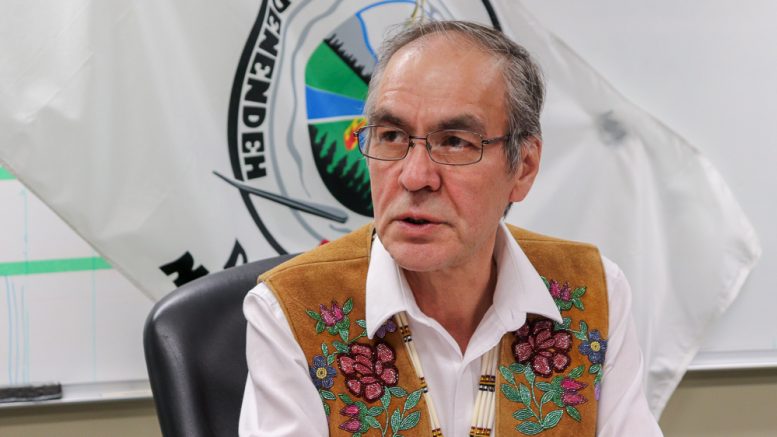The ongoing outbreak of COVID-19 in the Sahtú is bringing the disparities of healthcare between Yellowknife and communities to the forefront, says Dene National Chief Norman Yakeleya.
“We’re starting to see the distinction of the two standards of the healthcare system in the North,” Yakeleya told reporters Thursday morning.
One thing he’d like to see done is deploy more rapid tests to the communities.
“Rapid testing has been available and in use in all NWT health centres since December,” said David Maguire, Northwest Territories Health and Social Services spokesperson. He also confirmed the tests are being used in the current outbreak, but that “sometimes we have to send testing to the lab” is someone is symptomatic or has been exposed to the virus.
But the issues are deeper than testing. Yakeleya spoke about a lack of housing and overall health services the communities are facing.
“As much as the frontline workers are doing a really good job and the community members are doing a good job, working with the department of health, we’re being exposed to the situations that our communities have always been addressing with government, both federal and territorial,” he said.
Nonetheless, Yakeleya said the first order of business is “putting the fire out” on the current outbreak. That includes putting a call to the federal government and military if necessary. For its part, he said, the Dene Nation has put together an internal COVID response team to assist governments where possible.
Fort Good Hope Chief Tommy Kakfwi has already asked for more support in enforcing the containment order.
According to CBC, the territorial government has reached out to their federal counterparts and Red Cross to fill gaps in its response. Cabin Radio has reported that the GNWT has not yet contacted the military for support.
Yakeleya urged healthy residents to go out on the land and avoid large gatherings. He also called on residents to get vaccinated.
“This virus doesn’t care who you are, where you are, what status you are. It’ll spread… And if you think you can outsmart it, outdo it, well you’ve got another thing coming,” he said.
According to GNWT data, 66 per cent of Sahtú residents are fully vaccinated and 26 per cent unvaccinated. Colville Lake has the lowest vaccination rate in the NWT at 28 per cent full vaccination and 56 per cent unvaccinated.
“We’re fighting for our survival as a nation,” said Yakeleya.
Dene Nation is scheduled to have its annual general assembly and election in Łı́ı́dlı̨ı̨ Kų́ę́ from Sept. 14-16. Yakeleya said he will be speaking with chiefs and other leaders and decide whether to postpone the assembly.
Updated Aug. 19 4:45 p.m. with a response from NTHSSA.





